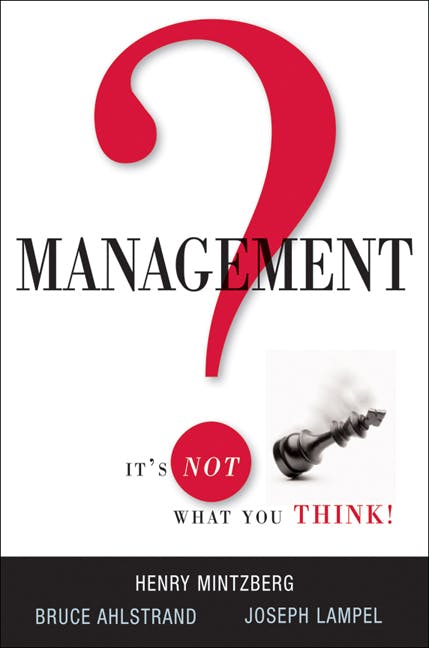By Henry Mintzberg, Bruce Ahlstrand and Joseph Lampel
Acheson’s Rule of the Bureaucracy: A memorandum is written not to inform the reader but to protect the writer.
Berra’s Law: You can observe a lot just by watching.
Bonafede’s Revelation: The conventional wisdom is that power is an aphrodisiac. In truth, it’s exhausting.
Boren’s Laws of the Bureaucracy:
- When in doubt, mumble.
- When in trouble, delegate.
- When in charge, ponder.
Cropp’s Law: The amount of work done varies inversely with the amount of time spent in the office.
Dave’s Law of Advice: Those with the best advice offer no advice.
Dobbins’ Law: When in doubt, use a bigger hammer.
Principle of Displaced Hassle: To beat the bureaucracy, make your problem their problem.
Dow’s Law: In a hierarchical organization, the higher the level, the greater the confusion.
Epstein’s Law: If you think the problem is bad now, just wait until we’ve solved it.
Grossman’s Misquote: Complex problems have simple, easy to understand wrong answers.
Heller’s Myths of Management: The first myth of management is that it exists. The second myth of management is that success equals skill. Corollary (Johnson): Nobody really knows what is going on anywhere within your organization.
Hendrickson’s Law: If a problem causes many meetings, the meetings eventually become more important than the problem.
Hofstadter’s Law: It always takes longer than you expect, even when you take into account Hofstadter’s Law.
Kettering’s Laws: If you want to kill any idea in the world today, get a committee working on it.
The First Myth of Management: It exists.
Maugham’s Thought: Only a mediocre person is always at his best.
McGovern’s Law: The longer the title, the less important the job.
Pareto’s Law (The 20/80 Law): 20 percent of the customers account for 80 percent of the turnover, 20 percent of the components account for 80 percent of the cost, and so forth.
Parkinson’s First Law: Work expands to fill the time available for its completion.
Parkinson’s Second Law: Expenditures rise to meet income.
Parkinson’s Third Law: Expansion means complexity; and complexity decay.
Parkinson’s Fourth Law: The number of people in any working group tends to increase regardless of the amount of work to be done.
Parkinson’s Fifth Law: If there is a way to delay an important decision the good bureaucracy, public or private, will find it.
Patton’s Law: A good plan today is better than a perfect plan tomorrow.
Peter Principle: In every hierarchy, whether it be government or business, each employee tends to rise to his level of incompetence; every post tends to be filled by an employee incompetent to execute its duties. Corollaries:
- Incompetence knows no barriers of time or place.
- Work is accomplished by those employees who have not yet reached their level of incompetence.
- If at first you don’t succeed, try something else.
Peter’s Observation: Super-competence is more objectionable than incompetence.
Pierson’s Law: If you’re coasting, you’re going downhill.
Terman’s Law of Innovation: If you want a track team to win the high jump, you find one person who can jump seven feet, not seven people who can jump one foot.
Wolf ’s Law (An Optimistic View of a Pessimistic World): It isn’t that things will necessarily go wrong (Murphy’s Law), but rather that they will take so much more time and effort than you think if they are not to go wrong.
Wolf ’s Law of Decision-Making: Major actions are rarely decided by more than four people. If you think a larger meeting you’re attending is really ‘hammering out’ a decision, you’re probably wrong. Either the decision was agreed to by a smaller group before the meeting began, or the outcome of the larger meeting will be modified later when three or four people get together.
Wolf ’s Law of Management: The tasks to do immediately are the minor ones; otherwise, you’ll forget them. The major ones are often better to defer. They usually need more time for reflection. Besides, if you forget them, they’ll remind you.
Wolf ’s Law of Meetings: The only important result of a meeting is agreement about next steps.
Wolf ’s Law of Planning: A good place to start from is where you are.
Zimmerman’s Law: Regardless of whether a mission expands or contracts, administrative overhead continues to grow at a steady rate.
Zimmerman’s Law of Complaints: Nobody notices when things go right.
Zusmann’s Rule: A successful symposium depends on the ratio of meeting to eating.
Excerpted from Management? It’s NOT What You THINK! by Henry Mintzberg, Bruce Ahlstrand, and Joseph Lampel. Copyright © 2011 Henry Mintzberg, Ltd., Bruce Ahlstrand, and Joseph Lampel. All rights reserved. Published by AMACOM Books, http://www.amacombooks.org, a division of American Management Association, 1601 Broadway, New York, NY. 10019.
